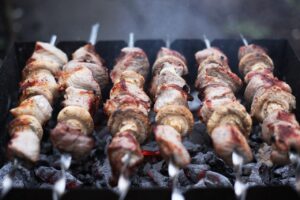Are you a grilling enthusiast looking to upgrade to a natural gas grill for the ultimate outdoor cooking experience?
One important factor to consider is the size of the gas line that connects your grill to the gas source.
In this guide, we’ll walk you through everything you need to know about selecting the correct gas line size for your natural gas grill.
Factors that Determine Gas Line Size
BTU Rating of the Grill
The BTU (British Thermal Unit) rating of your grill is a crucial factor in determining the appropriate gas line size. BTU measures the heat output of your grill, and a higher BTU rating requires a larger gas line to provide an adequate flow of gas to your grill. Check the grill’s specifications or consult the manufacturer’s guide to find the BTU rating.
Distance Between Grill and Gas Meter
The distance from your natural gas grill to the gas meter also plays a role in gas line sizing. The longer the distance, the more resistance there is in the gas line, which can lead to a decrease in gas flow. If your grill is located far from the gas meter, it may require a larger gas line diameter to compensate for this resistance and ensure proper gas supply.
Recommended Gas Line Sizes
Residential Gas Line Standards
For residential grilling setups, the most common gas line sizes are 1/2-inch and 3/4-inch. A 1/2-inch gas line can typically supply up to 35,000 BTUs, while a 3/4-inch gas line can handle higher BTU ratings, generally up to 50,000.
Keep in mind that these sizes are general guidelines, and it’s essential to consider the specific BTU rating and distance requirements of your grill when making a decision. Consulting a professional plumber or gas technician can provide you with expert advice tailored to your specific needs.
Upgrading to a Larger Line When Necessary
In some cases, you may find that your grill’s BTU rating or the distance to the gas meter exceeds the capacity of a standard gas line. In such situations, upgrading to a larger gas line diameter, such as 1-inch, might be necessary. This ensures a sufficient gas supply and prevents any performance issues or safety concerns.
Installation Guidelines
Professional Installation Recommendations
While it’s possible to connect your natural gas grill to the gas line yourself, it’s highly recommended to enlist the services of a licensed professional. Proper installation by a qualified plumber or gas technician eliminates any safety risks and ensures compliance with local building codes and regulations.
Safety Precautions
When installing a gas line for your natural gas grill, safety should be the top priority. Here are some essential safety precautions to consider:
- Use high-quality gas lines and connectors designed for outdoor use.
- Check for leaks using a gas leak detector solution or soapy water. Bubbles indicate a leak, which should be promptly addressed.
- Avoid using excessive force when connecting gas lines to prevent damage or looseness.
- Install a gas shut-off valve near the grill for easy control in case of emergency.
Common Questions and Answers
| Question | Answer |
|---|---|
| What size gas line do you need for a gas grill? | The gas line size depends on the grill’s BTU rating and the distance to the gas meter. Consult the manufacturer’s guide or a professional for accurate sizing recommendations. |
| How do you choose the right gas connector size? | To choose the right gas connector size, match the connector’s diameter with the gas line diameter. It’s crucial to ensure a tight, secure connection for optimal safety and performance. |
Conclusion
Selecting the appropriate gas line size for your natural gas grill is vital for safe and efficient grilling. Consider the BTU rating of your grill, the distance to the gas meter, and consult professional advice when needed.
By following these guidelines and taking necessary safety precautions, you can enjoy fantastic grilling experiences with your natural gas grill for years to come.
Remember, when it comes to gas line installation, it’s always better to be safe than sorry. Prioritize your safety and the expertise of professionals in ensuring a hassle-free and enjoyable grilling journey.
